#Live at the Lyceum
Text
The Sisters Of Mercy - No Time To Cry
#The Sisters Of Mercy#Halloween#Live at the Lyceum#London#31-10-1984#No Time To Cry#Format:#Cassette#Compilation#Unofficial Release#Goth Rock#gothic rock#UK
44 notes
·
View notes
Text
CABARET VOLTAIRE // OBSESSION
[LIVE @ THE LYCEUM, rec. 1981]
#audio#cabaret voltaire#richard h kirk#industrial#electro#experimental#live#live at the lyceum#80s#electronic#music#u
28 notes
·
View notes
Note
Create another valyrian household that escaped Valyria. They hid themselves away by magic on an island not visible to anyone, they don't wish to be seen. On an island with a huge fortress accompanied with another smaller fortress which is basically a library. They are similar to Targaryens, but much more knowledgeable on everything (thanks to Valyria). They ride dragons, purple shades of eyes, silver-gold hair. Only two differences being, they have never been married outside of family(yuck) with no Westerosi blood therefore very different customs, fully valyrian customs and traditions rather than Westerosi+valyrian(Targs, Vels). Hope you have fun, thank you:)

𓈒ㅤׂㅤ 𓇼 ࣪ 𝐇𝐎𝐔𝐒𝐄 𝐋𝐘𝐑𝐈𝐄𝐋𝐋𝐄 𓈒ㅤׂㅤ⭒⠀


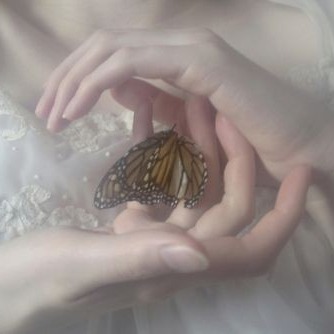
꒰͡ ⠀ ִ 𝐺𝐸𝑁𝑇𝐿𝐸 𝐴𝑁𝐷 𝐿𝑂𝑉𝐼𝑁𝐺 ⠀ׂ ⠀ ͡꒱
─ 𝘈 𝘤𝘳𝘦𝘢𝘵𝘶𝘳𝘦 𝘰𝘧 𝘮𝘢𝘨𝘪𝘤, 𝘨𝘳𝘢𝘤𝘦, 𝘢𝘯𝘥 𝘭𝘪𝘨𝘩𝘵 𖤐
─ 𝘈 𝘣𝘦𝘪𝘯𝘨 𝘰𝘧 𝘱𝘶𝘳𝘪𝘵𝘺, 𝘢 𝘸𝘰𝘯𝘥𝘳𝘰𝘶𝘴 𝘴𝘪𝘨𝘩𝘵 𖤐

In the rich tapestry of Valyrian history, woven with the threads of power, magic, and dragonfire, the House Lyrielle stands as a testament to the enduring grace and wisdom of Old Valyria. Their story is a whisper on the wind, a secret melody sung by the waves that surround their hidden island sanctuary. Known to but a few, the Lyrielles are the guardians of a legacy untainted by the ambition and corruption that led to the Doom.
The sigil of House Lyrielle is as enigmatic as the house itself—an angelic dragon, graceful and serene, enwreathed in a ring of white roses against a backdrop of deepest emerald. The dragon, smaller in stature but fierce in its intelligence and agility, represents the nature of the Lyrielles' own dragons. The emerald ground symbolizes their secluded island, a jewel hidden in the vast sea, and the white roses signify the purity of their intentions and the mystical barriers that veil their home from the unwary eye.
Their words, "Beyond Sight, Within Light," speak to the heart of the House Lyrielle ethos. They live beyond the sight of the known world, in a realm of their own making, where knowledge and virtue shine brighter than any Valyrian steel. These words are a promise of their commitment to the greater good, a reminder of their hidden presence guiding the fate of the world from the shadows.
The Lyrielles, in their seclusion, have preserved the purity of their Valyrian bloodline, untouched by Westerosi influence. Their customs and traditions remain a living tapestry of Old Valyria's glory, a culture preserved in amber amidst the tumultuous seas of change.
Education and learning are held in the highest regard. The smaller fortress, known as the Lyceum of Light, houses a vast collection of scrolls and tomes, not only on magic and dragonlore but on the sciences, arts, and philosophies of the wider world. Even though the Lyrielles seclude themselves from the outside, they possess an insatiable thirst for knowledge that keeps their minds as sharp as their swords.
The Lyrielles are ethereal in their beauty, with eyes that hold the mysteries of the universe—shades of purple that shift with the light. Their silver-gold hair flows like liquid moonlight, a hallmark of their Valyrian bloodline. They are skilled in the art of healing, their touch capable of mending wounds that would confound even the most learned maesters. Their bond with their dragons is profound, rooted in a deep understanding and respect for these majestic creatures.
Their dragons, lithe and swift, mirror their masters in both appearance and temperament. With scales that catch the moon's light, casting reflections in hues of amethyst and sapphire, they are specters of the night sky, their presence felt rather than seen, their agility unmatched by any creature, mythical or otherwise.
To the Lyrielles, the world outside is a place of beauty marred by the scars of greed and violence. They see themselves as custodians of what remains pure and true. Their philosophy is one of balance and harmony, seeking to preserve the natural world and its wonders. They are benevolent, yet their kindness is not a weakness but a strength, fortified by their unwavering sense of justice and fairness.
The Lyrielles embody a paradox. They are both guardians and isolationists, wielding their power to protect the natural world and its untold secrets while shunning the very societies they seek to preserve from afar. Their personalities are marked by a gentle demeanor, an innate grace that belies the strength and wisdom that centuries of unbroken tradition have instilled in them. They are the custodians of healing, their knowledge of the arcane arts allowing them to mend wounds and cure maladies thought beyond the reach of mortal hands.
Yet, for all their power and knowledge, the Lyrielles possess a naivety born of their seclusion. They view the outside world through the lens of caution and fear, tales of its dangers passed down through generations. This isolation has fostered a deep sense of kinship and loyalty among them, their bonds unbreakable, their trust in one another absolute.
In a realm where the quest for power often leads to ruin, House Lyrielle remains a beacon of hope. They are the whisper in the heart of the storm, the unseen hand that guides towards light. Their existence is a testament to the belief that even in the darkest of times, there are those who shine brightly, not for glory or fame, but for the love of all that is good and true in the world.

My other original house:
House Celestyr
House Valysar
@fragileheartbeats . Don't plagiarise, repost, or translate any of my works on here or any other websites.
@emily2003alzaga @nash-dara @altaircc @heavenly1927 @omgsuperstarg @asoiafhyperfixation
#house lyrielle#house of the dragon#house targaryen#house of dragons#house of dragon oc#house of the dragon x reader#hotd fanfic#hotd oc#hotd x reader#a song of ice and fire#song of ice and fire#game of thrones x reader#game of thrones oc#game of thrones#aemond fanfiction#aemond one eye#aemond targaryen#aemond x reader#daemon targeryan#daemon targaryen x reader#writing#fantasy#novel#story#daemon x reader#aegon ii targaryen x reader#aegon x reader#aegon ii targaryen#aegon ii x reader#asoiaf
319 notes
·
View notes
Text

FATHER & SON: James Earl Jones with his Father Robert Earl Jones on Stage in the 1962 Production "Moon on a Rainbow Shawl."
Robert Earl Jones (February 3, 1910 – September 7, 2006), sometimes credited as Earl Jones, was an American actor and professional boxer. One of the first prominent Black film stars, Jones was a living link with the Harlem Renaissance of the 1920s and 1930s, having worked with Langston Hughes early in his career.
Jones was best known for his leading roles in films such as Lying Lips (1939) and later in his career for supporting roles in films such as The Sting (1973), Trading Places (1983), The Cotton Club (1984), and Witness (1985).
Jones was born in northwestern Mississippi; the specific location is unclear as some sources indicate Senatobia, while others suggest nearby Coldwater. He left school at an early age to work as a sharecropper to help his family. He later became a prizefighter. Under the name "Battling Bill Stovall", he was a sparring partner of Joe Louis.
Jones became interested in theater after he moved to Chicago, as one of the thousands leaving the South in the Great Migration. He moved on to New York by the 1930s. He worked with young people in the Works Progress Administration, the largest New Deal agency, through which he met Langston Hughes, a young poet and playwright. Hughes cast him in his 1938 play, Don't You Want to Be Free?.
Jones also entered the film business, appearing in more than twenty films. His film career started with the leading role of a detective in the 1939 race film Lying Lips, written and directed by Oscar Micheaux, and Jones made his next screen appearance in Micheaux's The Notorious Elinor Lee (1940). Jones acted mostly in crime movies and dramas after that, with such highlights as Wild River (1960) and One Potato, Two Potato (1964). In the Oscar-winning 1973 film The Sting, he played Luther Coleman, an aging grifter whose con is requited with murder leading to the eponymous "sting". In the later 20th century, Jones appeared in several other noted films: Trading Places (1983) and Witness (1985).
Toward the end of his life, Jones was noted for his stage portrayal of Creon in The Gospel at Colonus (1988), a black musical version of the Oedipus legend. He also appeared in episodes of the long-running TV shows Lou Grant and Kojak. One of his last stage roles was in a 1991 Broadway production of Mule Bone by Hughes and Zora Neale Hurston, another important writer of the Harlem Renaissance. His last film was Rain Without Thunder (1993).
Although blacklisted by the House Un-American Activities Committee in the 1950s due to involvement with leftist groups, Jones was ultimately honored with a lifetime achievement award by the U.S. National Black Theatre Festival.
Jones was married three times. As a young man, he married Ruth Connolly (died 1986) in 1929; they had a son, James Earl Jones. Jones and Connolly separated before James was born in 1931, and the couple divorced in 1933. Jones did not come to know his son until the mid-1950s. He adopted a second son, Matthew Earl Jones. Jones died on September 7, 2006, in Englewood, New Jersey, from natural causes at age 96.
THEATRE
1945 The Hasty Heart (Blossom) Hudson Theatre, Broadway
1945 Strange Fruit (Henry) McIntosh NY theater production
1948 Volpone (Commendatori) City Center
1948 Set My People Free (Ned Bennett) Hudson Theatre, Broadway
1949 Caesar and Cleopatra (Nubian Slave) National Theatre, Broadway
1952 Fancy Meeting You Again (Second Nubian) Royale Theatre, Broadway
1956 Mister Johnson (Moma) Martin Beck Theater, Broadway
1962 Infidel Caesar (Soldier) Music Box Theater, Broadway
1962 The Moon Besieged (Shields Green) Lyceum Theatre, Broadway
1962 Moon on a Rainbow Shawl (Charlie Adams) East 11th Street Theatre, New York
1968 More Stately Mansions (Cato) Broadhurst Theatre, Broadway
1975 All God's Chillun Got Wings (Street Person) Circle in the Square Theatre, Broadway
1975 Death of a Salesman (Charley)
1977 Unexpected Guests (Man) Little Theatre, Broadway
1988 The Gospel at Colonus (Creon) Lunt-Fontanne Theatre, Broadway
1991 Mule Bone (Willie Lewis) Ethel Barrymore Theatre, Broadway
FILMS
1939 Lying Lips (Detective Wenzer )
1940 The Notorious Elinor Lee (Benny Blue)
1959 Odds Against Tomorrow (Club Employee uncredited)
1960 Wild River (Sam Johnson uncredited)
1960 The Secret of the Purple Reef (Tobias)
1964 Terror in the City (Farmer)
1964 One Potato, Two Potato (William Richards)
1968 Hang 'Em High
1971 Mississippi Summer (Performer)
1973 The Sting (Luther Coleman)
1974 Cockfighter (Buford)
1977 Proof of the Man (Wilshire Hayward )
1982 Cold River (The Trapper)
1983 Trading Places (Attendant)
1983 Sleepaway Camp (Ben)
1984 The Cotton Club (Stage Door Joe)
1984 Billions for Boris (Grandaddy)
1985 Witness (Custodian)
1988 Starlight: A Musical Movie (Joe)
1990 Maniac Cop 2 (Harry)
1993 Rain Without Thunder (Old Lawyer)
TELEVISION
1964 The Defenders (Joe Dean) Episode: The Brother Killers
1976 Kojak (Judge) Episode: Where to Go if you Have Nowhere to Go?
1977 The Displaced Person (Astor) Television movie
1978 Lou Grant (Earl Humphrey) Episode: Renewal
1979 Jennifer's Journey (Reuven )Television movie
1980 Oye Ollie (Performer) Television series
1981 The Sophisticated Gents (Big Ralph Joplin) 3 episodes
1982 One Life to Live
1985 Great Performances (Creon) Episode: The Gospel at Colonus
1990 True Blue (Performer) Episode: Blue Monday
#james earl jones#black tumblr#black literature#black community#black excellence#blackexcellence365#actor#robert earl jones#stage actor
202 notes
·
View notes
Text
Pass it on
This just in:
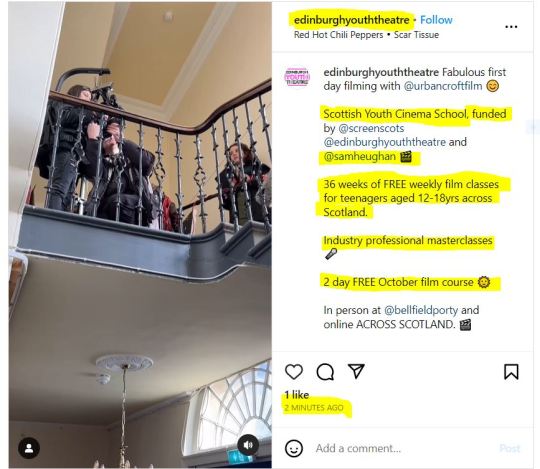
Meet the new Scottish Youth Cinema School. Funded by Screen Scotland, EDI's Youth Theatre and S. Tailored for 12-18 years' old, just to give them a first opportunity to get acquainted & immersed in the fascinating world of cinema. With a consistent offer to boot: 9 months of weekly film classes and industry professional masterclasses. All FREE.
The partnership is very prestigious: Screen Scotland is part of Creative Scotland, the Scottish Government's body competent for supporting 'the arts, screen and creative industries across all parts of Scotland on behalf of everyone who lives, works or visits'. As such, funding is either via the Scottish public budget, or (as is customary in the UK - I successfully proposed a similar scheme in my country, a long time ago) by using part of the National Lottery's profits.
Passing it on and giving back to the community. Quietly and unassumingly - by now, we're used to his MO.
The boy who used to be an usher at Edinburgh's Lyceum Theatre. That good man bitches love to bitch about.
Well done, Sir! I see great things.
245 notes
·
View notes
Text

The B-52's in their live debut playing in London's Lyceum Ballroom, UK as support for The Tourists, July 8, 1979
193 notes
·
View notes
Text
I want to live in an Art Gallery / Bookstore / Weird cozy cafe / Museum / Observatory / Lyceum / Tower . . . Place . .
73 notes
·
View notes
Text
Lucius Spriggs is a nobleman HC
my personal hc which i love with all my heart and soul and which seems so real to me is that he is from a noble family. my judgments are based on the behavior of the character in certain situations, and i hope that there are those who also think so.
first of all, let's remember that Lucius knows how to write, can read, and draw beautifully (whatever his drawings are). as far as I know, not everyone could get an education at the beginning of the 18th century (when the series takes place). the ordinary working class had no access to education, and the ordinary family never had books, and no one exchanged letters. even clerical work was available only to those who had money or connections (most often family). for example, in the Russian empire (I am from Ukraine and studied its history), only the children of wealthy citizens or nobles could become clerical officials and any other workers that were in any way connected with writing and papers. to get such an education, one had to either hire personal teachers or attend boarding schools (lyceums), where education costs a lot of money.
the working class never had access to education and even those who lived in the cities rarely knew how to read. such luxury was available only to wealthy merchants, family business owners or doctors, who also did not come from ordinary families. education needs money. much money. and so it has always been.
even if we assume that Lucius learned to write, read, and draw on his own, it still seems unlikely. how? tell me how many of you learned this on your own. to start reading, you must at least learn how letters are read. if his parents are ordinary workers, then they most likely could not even write their own name (they would not need to). and Lucius was able and very legible.
second, his behavior. Lucius is squeamish about blood, does not like to work, and most likely simply does not even know how to do any difficult work. looking at him, I see a man who has never worked and never did anything himself. even household chores seem to him incomprehensible labor. it seems that he will not survive on the street for a week if suddenly he does not have a penny in his pocket. it’s just that a boy from a working-class district cannot be such a kid glove, because in those days children were attracted to real work from the age of 10 (sometimes even earlier). if so, then a Lucius who is at least 17 should be able to do a lot of menial work, and not shirk even the simplest task.
i would also like to remember that Lucius is not inclined to communicate only in obscenities and simple sentences. he can speak in hints, express his thoughts, and formulate sentences. he understands people well, and even with his free attitude to love and sex, he fucks anyone just for the sake of sex. this and much more speaks volumes about his level of education.
also, let's remember how back in the first episodes he was able to tell where to go based on his knowledge of the weather. believe me, a cat man has never been to school and has not been to the sea, he will not know this. to understand such things one needs knowledge in geography, biology, and astronomy. such knowledge is given only in lyceums or colleges.
Lucius, I think, left the house after learning that he was engaged to some noble lady or that his wedding was already planned. such marriages without the consent of the newlyweds themselves were not uncommon in those days among noble families who thought only about purity of blood, status, and wealth. for him, his own freedom is clearly higher than material wealth, therefore this is a completely expected step for him.
call me weird or challenge my headcanon but I can't shake the idea that Lucius Spriggs is a runaway aristocrat from an unwanted marriage.
63 notes
·
View notes
Text
The Sign of Four: In Quest of a Solution
You could find the back issues of most papers just by visiting a local library. Today, the British Newspaper Archive will, for a monthly subscription, allow you to look at a whole slew of vintage papers, including The Illustrated Police News for all your Victorian "true crime" reportage.
As mentioned before, a four-wheeler was a four-wheeled carriage with a driving seat on the top front and a luggage rack on the top; they costed more than the hansoms.
Doyle isn't very good with coming up with convincing Indian names, is he? Singh is the name used by a baptised male Sikh (Kaur is the female equivalent) i.e. a turban-wearing, dagger carrying one. Mahomet is a version of Mohammed.
The gas lights of London weren't hugely bright compared with modern street lights; you'd be able to find your way, but there's probably a decent chance you'd step in horse exhaust if you weren't careful.
The Lyceum Theatre, located on Wellington Street, dates back to 1765, but the current building is from 1834, rebuilt after a fire. It contains a balcony over the dress circle, a unique theatre.
GhostApple on Tumblr pointed out that Bram Stoker was the manager at that theatre at the time SIGN was released. The theatre at the time was run by Henry Irving and Ellen Terry, two of the biggest stars of their days, becoming Sir Henry and Dame Ellen later in life. Stoker based Dracula on Irving, but sadly Irving never actually played the Count on stage.
After a further rebuild, time as a ballroom, a demoliton threat and two closures, the Lyceum reopened in 1996 and is a Grade II* listed building, the second highest grade. Since 1999, it is the London home of The Lion King.
The normal garb of a coachman would be a top hat and a heavy double-breasted overcoat; they would be driving their vehicle in a vast array of weather conditions, sometimes on the same day as anyone who has lived in Britain can tell you.
The coach is going rather fast at this point, possibly dangerously so. The Offences against the Person Act 1861 created an offence of "causing bodily harm by wanton or furious driving"; which could mean that if a horse-drawn vehicle hit another vehicle or a person, the driver could get up to two years in prison. The offence remains on the books, being used against horse-drawn carriage drivers (still a thing, particularly in the Traveller community), motorists when not on a road or public land and cyclists, as the Road Traffic Act 1988 is not available in these cases - it is a Crown Court-only offence. In 2017, a cyclist riding at speed in East London with no front brakes hit and killed a woman; the jury found him not guilty of manslaughter, but convicted him of this offence, with the result he got a 18-month sentence.
Tiger attacks were very common in British India; tigers are known to attack humans when feeling threatened (human encroachment on their territory is a big problem)), injuries prevent them from going after other prey or they mistake a human for something else, or if one is riding a bike, their chase instinct may kick in. 33,247 people were killed by tigers between 1876 and 1912. In 2022, the Indian government recorded 112 tiger-caused deaths, up from 59 in 2021. Some tigers have ended up killing over 100 people before being shot dead.
For those having a go at Watson for shooting at a tiger cub, we don't know how old or how big the tiger cub was. A newborn tiger maybe less than 10 pounds and look adorable, but a ten month male could easily be over 100 pounds and looks rather like a full-grown adult. Especially in the dark.
This said, humans are a good deal worse than tigers. The British cleared vast amounts of their habitat for the timber to build their railways. Hunting tigers for "sport" had been a common practice for the Indian nobility and the British ruling classes liked doing it just as much, bringing modern firearms along. Remember Dr. Sterndale from DEVI? There's a chance Watson might have gone hunting himself, sadly.
The tiger hunting got worse post-independence as improved air travel made it easier for game hunters to get to India. The Indian government banned tiger hunting in 1972 and the Bengal tiger population is slowly recovering. The size of reserves have not kept up with the population and so some tigers have gone into human areas for food, usually livestock but sometimes humans. If a tiger starts killing people and attempts to tranquilise it fail, then lethal force will be authorised. In 2022, T-104, a three-year-old dubbed the "man-eater of Champaran", killed nine people before he was shot dead by the police, who conducted their search riding elephants.
The "Surrey side" refers to the southern bank of the river, the other being the "Middlesex side" referring to the now defunct county. Those terms remain in use for the Boat Races; with the Middlesex side being on the right as the crews row upstream. The two "stations" have various advantages and disadvantages; Middlesex helps at the start end, Surrey in the middle.
Vauxhall Bridge was in rather a bad shape by this point and would be replaced in 1906, five years late due to various construction and design issues. The modern bridge is notable for having the very distinctive headquarters of the Secret Intelligence Service next to its southern end.
"Hindoo" was a contemporary spelling of Hindu, today considered derogatory.
"Sahib" is the Indian equivalent of "sir" or "master"; "Mem-Sahib" is the female version. The Indians used it when speaking to white people (or about them, possibly sarcastically) and the British officers would use it with their Indian counterparts. It is less common now, but still widely used in the Indian Army and about people in positions of power.
"Khitmutgar" was a term for a male butler or underservant who would set the table for dinner etc.; during the Bengal Presidency, these would typically as opposed to Hindus.
13 notes
·
View notes
Text
The Sisters Of Mercy - Body And Soul
#The Sisters Of Mercy#Halloween#Live at the Lyceum#London#31-10-1984#Body And Soul#Format:#Cassette#Compilation#Unofficial Release#Goth Rock#gothic rock#UK
10 notes
·
View notes
Text
My journey is all mapped out: a two-week Dracula tour of Europe

A fun fact about me is that I enjoy planning holidays that I have no intention of taking. So, if I had two free weeks and more money than I actually do, here's the Dracula-inspired journey around Europe that I might consider.
(Spoilers under the cut)
Days 1-3: Whitby

This is the opportunity to visit all the key Dracula locations, from a coastal walk to Robin Hood's Bay to gazing out over the village and the sea from Mina and Lucy's favourite spot in the graveyard of St Mary's.
In non-Dracula things, Whitby Goth Weekend happens twice a year in April and October. I recommend the Magpie Café for fish and chips.
Day 4: travel to London

Most of the long train journeys in this plan are delightful overnight sleeper services that will make you feel like you're right there with Jonathan and Mina rattling across Europe. Unfortunately, the journey from Whitby to London is not one of them.
Services are infrequent and the journey takes a solid 5 hours. But the start, where you go very very slowly through the beautiful North York Moors, isn't too bad.
Days 5-7: London

There's a whole heap of things to see in London on a theme by either Dracula or Bram Stoker:
The Lyceum Theatre, where Bram Stoker worked for 27 years
The various houses that Bram Stoker lived in
Golders Green Crematorium, where Bram Stoker's ashes can be visited by appointment
Assorted Dracula settings, such as those the Harkers visited on their London day trip
I'd also suggest a visit to Highgate Cemetery, which may have been part of the inspiration for Lucy's tomb (pop in on Karl Marx and Douglas Adams while you're there), and the British Library for general literary joy.
Exeter is a 2.5 hour train journey from London, so you could also go there, either overnight or for a speedy day-trip, if you're a completist. But personally I'd skip it and spend the time going to see the Lion King at the Lyceum or a Shakespeare play at the Globe instead.
Day 8: Paris

The characters in Dracula take a number of different routes to get across Europe, but I've gone with the route that the Crew of Light take as they go to hunt Dracula down in his home.
That means following the Man in Seat 61 guide for travelling from London to Romania by train, taking an early Eurostar to get yourself to Paris. You'll only have a few hours in Paris before the evening sleeper train, but it should be enough to visit Père Lachaise Cemetery, where Oscar Wilde is buried.
Day 9: Vienna

You'll arrive in Vienna around 10am, then have the day to spend there until another evening train. Personally, I'd spend the time visiting the Hofburg Palace and Sisi Museum; Empress Elisabeth (Sisi) of Austria was famous in the late 19th century and her tragic life story feels fitting for a Dracula tour.
Yes, this plan involves fast trains crossing multiple European countries without much of a breather. Just like they do in Dracula :)
Day 10: Cluj-Napoca

Note: I've visited all the other destinations in this guide, but never been to Romania, though I'd really like to go to Cluj in particular. So from this point on, this is based on googling, not first-hand knowledge.
Cluj, referred to by the German name of Klausenburg in Dracula, is the unofficial capital of Transylvania. Your sleeper train from Vienna should get there around 8.20am, in time to hop on a tram to the Old Town's cluster of breakfast places. I've been told that Cluj is a lively, student-y city with great nightlife and festivals.
Days 11-14: Romania

Time to explore Romania! At this point there's a decision to make. On the one hand, there's strict adherence to the settings of Dracula, in which case you'll want to head to Bistrița, or maybe even extend your journey on to Varna or Galați.
On the other hand, you could go more on vibes. In which case, hire a car to drive through the remoter parts of Transylvania, then turn south to Bran Castle, which has very little actual connection to Dracula but certainly looks the part.
-------
In the unlikely event that anyone actually does this journey off the back of this post, please let me know how it goes. I'd be so thrilled to hear about it!
43 notes
·
View notes
Text

Paul Simonon performs live at The Lyceum , London , England , October 18th , 1981 .
©️ Steve Rapport/Getty Images
#paul simonon#the clash#uk punk#punk aesthetic#punk boy#the only band that matters#punk rock#70s punk#80s punk#punk#punk music#punk attitude#bass player#black and white photography#chiaroscuro#the lyceum#london#england#1981#steve rapport#getty images
59 notes
·
View notes
Photo

Happy New Year!!! 2024 is starting off with a bang for Stormfire Productions, that's for sure. We are thrilled to announce the early bird sales are now open for the ORTIZ TWINS ARE COMING HOME launch party! Join us at the Lyceum in Alexandria on February 24th for a live premiere of the pilot episode of this new fantasy audio drama about twins on the border reconnecting with their family's culture and history. Proceeds support the full run of the 12-episode series, and 5% of ticket sales will also go towards local low-income advocacy organization @tenantsandworkers. Get your tickets now at ortiztwins.com! #dcevents #dmvevents #AlexandriaLiving #indie #podcast #audiodrama #fictionpodcast
16 notes
·
View notes
Text
Talkingpoints 2 what he has to say on girls, women and relationships.
Now we pretty much guessed that there wouldn't be much he would share on the subject and he hasn't gone into any great detail.
His first kiss was with a girl called Alice aged 10 who was his childhood friend, she was outdoorsy like him and he felt comfortable in her company. The kiss was part of a game Sleeping Beauty and the Prince, a King and his Queen then they just went back to being friends.
As he started to have feelings about girls he didn't have much confidence in himself, he stood out for being tall, wore thick glasses, was slightly chubby and was very sensitive. He preferred to stay on the fringes in class and would hold back with friends.
When the family moved to Edinburgh he attended the James Gillespie's school for one year his Mum suggested a move to a Steiner education so he could develop his creative side. He wore jeans and a tie-dyed t-shirt as he thought it looked cool and hoped he would fit in with the creative types, he wanted to impress the girls as he thought they were smart, gifted and grown up. He doesn't mention any girlfriends while at school or the failed date at McDonalds, Wimpy, Burger King etc
In the first year of his gap year he travelled to Europe with four friends with the prospect of meeting local girls and drinking beer again doesn't go into detail.
The second year he joined the Royal Lyceum Youth Theatre and was infatuated with a girl called Emma, he would arrive early and stay behind to catch her eye but doesn't say if anything happened.
When he attended the Royal Scottish Academy as it was known then he moved in with a male student and two female students Helen and Flortjee. He said like all first years they got high and wandered the streets looking for the best Sunday roasts and went clubbing. No mention of any girlfriends.
There's a picture of him with the actress Elspeth Brodie when they starred in the theatre production of The Pearlfisher he said she beautifully captured the audience and his heart on and off the stage, he mentions an ex girlfriend of his who lived in Richard Maddens Glasgow apartment and confirmed her picture was in the book.
Whilst in London he dated someone for a while who was in his words a smart and ambitious production assistant at Working Title Films, they moved in together but it only lasted a week as they were not compatible in any way.
He's content in his own company but does look for love and companionship and has invested in several meaningful relationships giving 100% commitment and adores the romance, however, when it starts to feel perfect he starts to question can he sustain a relationship for 2, 5 or 10 years. Work makes it hard for him to settle down so doesn't want someone to commit when he can't return it so he moves on. There's no doubt his Father leaving the family has had a huge effect on him, as he said his Father created a family then removed himself from it and he doesn't want to be in the same position. When things look too perfect he bails it's a protective mechanism as he doesn't want to cause hurt to himself or others. The walk obviously gave him time to think so he says the next time he falls in love he should just enjoy the moment and not think ahead as he recognises he's undermining his chances of finding someone special.
He doesn't let people into his life with ease and trust takes time for him to establish, he has very few super close friends again probably because of his Father leaving when he was young, he simply enjoys his own company and craves it.
After the walk he returned home and savoured the stillness, he now sees his house as somewhere he could settle in for a long time to come, a family home perhaps but adds whatever that might mean.
Looking forward to your comments and thoughts on this and if I've left anything out maybe other bloggers who've read the book could fill in any of the gaps.
130 notes
·
View notes
Text

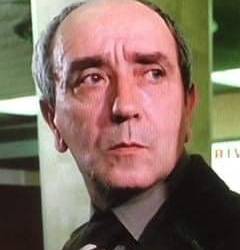

The Actor Phil McCall was born on November 26, 1925 in Glasgow.
A nostalgic one for us Scots, McCall had many parts in Film, Television and radio. After some experience on the amateur stage, he entered the Royal Scottish Academy of Music and Drama where he completed the drama course with distinction. Being a more mature student, he had no illusions about the profession he was entering, but a thirst for knowledge, a love for theatre, and for the arts continued throughout his life.
He was an avid reader of plays and literature which, allied to his understanding of the lives of ordinary working people, made him a powerful interpreter of many aspects of the human condition.
His successes ranged from pathos and grit in plays ancient and modern to hilarious dames in pantomime. For many thousands of people he will be remembered for his performances at Perth, Dundee, Glasgow Citizens, and the Pavilion, the Royal Lyceum, Edinburgh, and the Traverse Theatre, Edinburgh, Eden Court, Inverness, His Majesty's Aberdeen, and Motherwell Civic Theatre with resident companies or visiting with the Scottish Theatre Company.
His TV roles stretch from the early days in Z Cars, The Gorbals Boy, Minder and Monarch of the Glen. If his film appearances were less numerous, a few were jewels, even in cameo. It was a source of annoyance more than pleasure that, to non-theatregoers, he was best known for a television advertisement.
For some actors there is one stand out part you are remembered for, Phil McCall's might not have been on have won him any Baftas or Oscars but it is one of the most remembered for us Scots, Phil came outwith the immortal lines..."Pea and ham soup from a chicken, now that's clever".
It's a tragicly sad end to this post, Phil McCalls wife found him hanged at their home in Glasgow on 29 January 2002. He was due on stage that night at Glasgow’s Briggait Theatre on the opening night of the Grid Iron Theatre Production Fermentation, one of the most-anticipated Scottish stage plays in years.
It is believed he had suffered bouts of depression in his past, and aged at 76 it shows you that depression can affect you at any age, to live a full life like he did and take his own life is a lesson we should all take heed of, depression is a real illness, I my self suffer regularly, at 58 I have accepted it will not leave me, I survive day by day, doing these posts is a therapy for me.
13 notes
·
View notes
Text
🎶 The royal family meeting music royalty! 🎶

1963 - Princess Margaret meeting The Fab Four; John, Paul, George and Ringo and manager Brian Epstein in the background

1968 - Princess Anne meeting Motown legends The Supremes at the Royal Variety Performance at the London Palladium
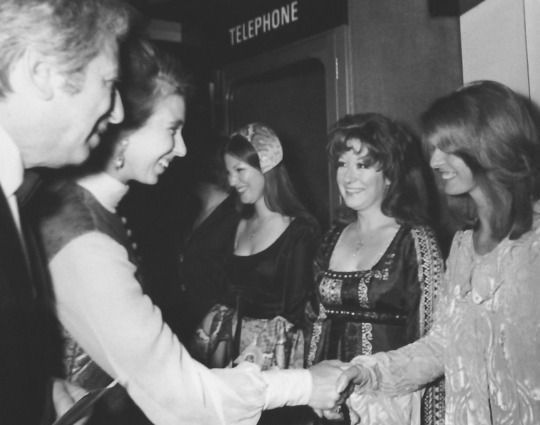
1972 - Princess Anne meeting Jane Asher, girlfriend of Paul McCartney from ‘63 to ‘68, at the charity benefit premiere of the film "Henry VIII and His Six Wives"
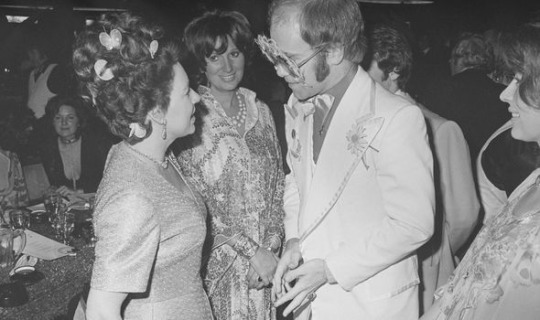
1974 - Princess Margaret talking to Elton John at a charity dinner
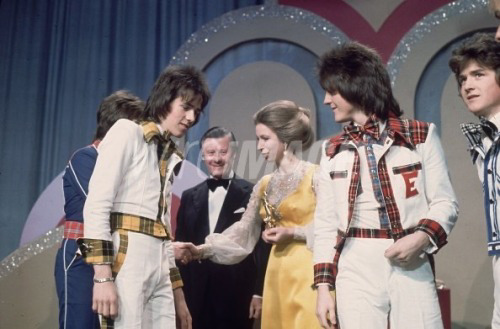
1975 - Princess Anne with members of the Bay City Rollers at the Carl Alan Awards held at the Lyceum Ballroom, London

1975 - Queen Elizabeth meeting Barbra Streisand at the premiere of Funny Lady (the sequel to her hit movie Funny Girl) in 1975.

1985 - Princess Diana with rock legends David Bowie, Brian May and Roger Taylor at the Live AID performance, Wembley Stadium
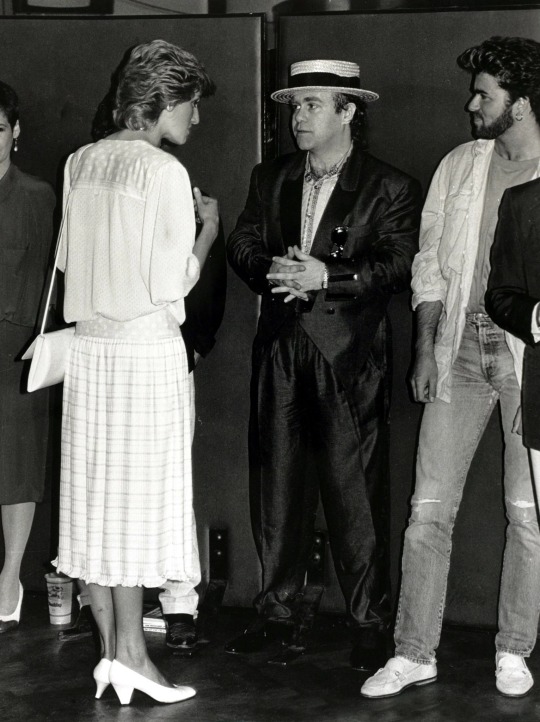
1985 - Princess Diana chatting with Elton John and George Michael at the Live AID Performance, Wembley Stadium

1997 - Queen Elizabeth meeting Posh, Scary, Ginger, Baby & Sporty AKA the Spice Girls backstage at the Royal Variety Performance, Victoria Palace Theatre

2012 - Queen Elizabeth talking to Elton John, Cliff Richard, Shirley Bassey, Tom Jones and Paul McCartney, backstage at her Diamond Jubilee concert held at Buckingham Palace
#i had a lot of fun making this#i hope you enjoy!#princess anne#princess royal#princess margaret#queen elizabeth ii#diana princess of wales#jane asher#paul mccartney#george harrison#john lennon#ringo starr#brian epstein#the beatles#the supremes#diana ross#barbra streisand#elton john#bay city rollers#spice girls#david bowie#queen band#brian may#roger taylor#george michael#tom jones#shirley bassey#cliff richard
112 notes
·
View notes